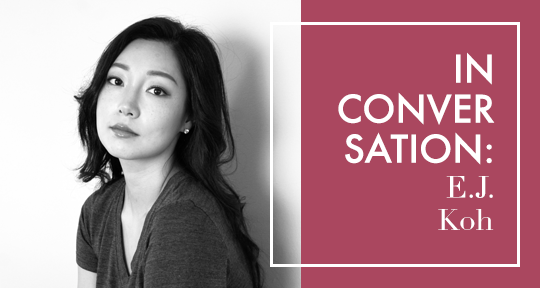E.J. Koh’s memoir, The Magical Language of Others, was published in January 2020, but I read it in lockdown a few months later. Since March, I have read or listened to this book at least four times, each time encountering something else that makes me come back to it. Koh’s memoir is a coming-of-age story framed by translations of the letters her mother sent her from Korea, where she and Koh’s dad relocated for work. It tells the heartfelt story of a young Korean-American woman who comes to poetry and translation, to Japanese, and to a deeper understanding of her own languages, English and Korean. And she weaves into this story, with palpable sincerity and magnanimity, the stories of generations of women before her who survived the Japanese occupation, the Jeju massacre, and one abandonment after another. In this interview, she talks about avoiding seamlessness and translating war, wounding, and the seemingly impossible.
Ruwa Alhayek (RA): Has translation allowed you to inhabit your mother’s letters in a different way?
E.J. Koh (EJK): Translating my mother’s letters for me is inseparable from experiencing the vast distance between us in my youth—from the US to South Korea, between English and Korean—and the violence of when that distance suddenly collided to a close. I am living my way back toward the pain of being separated and reunited again. I am holding two strings at the same time. One is the mother who delivered her child. The other is the child who can deliver her mother. That is why I say if my mother’s letters could sleep, my translations would be their dreams.
RA: If you were to issue a new translation of these letters, how do you think they might change?
EJK: I am in love with and feel deeply grateful for the work of translators. I’d be honored to see her letters translated again, by different translators. What occurs to me is how I leaned away from seamlessness, translation as if written in the historically dominant English, and hoped to let Korean remain—against erasure—choosing instead words with sound, syntax, and rhythm to keep pace with my mother’s voice running circles inside me. But I feel there is no one way, and the assumption of one is the failure to see what can be different and what can be changed.
RA: I was really inspired by the scene of your morning ritual in Japan where you sit in the coffee shop with the hanging vines from dawn until your classes start, memorizing ten pages from your pocket dictionary every day—is there something about that type of immersion that resembles the process of translation for you?
EJK: When I lived in Japan, I starved myself. I wouldn’t eat a proper meal until I could order in Japanese without error. My eating disorder entered my language, and discipline became a place where I could intellectualize my self-harm. I learned the language quickly but with shame and guilt—not opposites to but the very sources of pride. I used language to isolate myself. I say, Languages, as they open you up, can also allow you to close. Where before I depended on separation, now I move in the world by way of connection and humanity. READ MORE…

